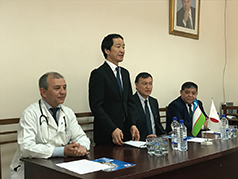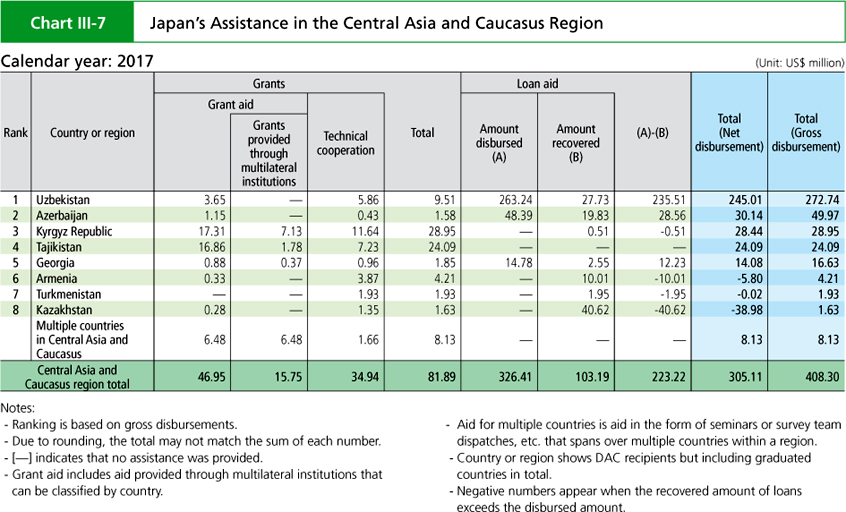6 Central Asia and Caucasus
The Central Asia and Caucasus region is surrounded by Russia, China, South Asia, the Middle East and Europe, and thus, the stability and development of this region significantly affects those of the Eurasian region. Also, since this region includes countries abundant of energy and mineral resources such as oil, natural gas, uranium, and rare metals, this region is also of strategical importance for Japan, which is carrying out its resource and energy diplomacy with the aim of diversifying resource supplying countries. From this viewpoint, Japan has been supporting nation-building efforts for long-term stability and sustainable development in this region, and the spread of fundamental values in the countries of the region, such as human rights, democracy, market economy, and the rule of law, while taking into consideration a broader regional perspective which covers Afghanistan, Pakistan, and other neighboring regions surrounding Central Asia.
■Japan’s Efforts
Since the Central Asia and Caucasus countries’ independence in 1991 following the collapse of the former Soviet Union, Japan has been providing assistance in diverse areas such as infrastructure development for economic development, human resources development for the transition to a market economy, and the rebuilding of social systems such as health and medical care, in order to support the efforts of each country towards the transition to market economies and economic development.
With regard to its relationship with Central Asia, based on the idea that it is important for the region to stabilize and develop as an open region, and for regional countries to work together to resolve common issues, Japan launched the “Central Asia plus Japan” dialogue framework in 2004, and has continued to strive to fulfill its role as a “catalyst” for regional cooperation. In recent years, Japan aim’s to promote more practical cooperation in addition to a variety of dialogues.
At the Twelfth Senior Officials Meeting (SOM) of the “Central Asia plus Japan” Dialogue held in Dushanbe, Tajikistan, in January 2018, the participants shared the view to put effort into the tourism sector as a new priority area of practical cooperation. At the fourth experts’ meeting held in February and second business dialogue held in March, based on this view, practical experts in tourism from the countries of Central Asia were invited to engage in an exchange of opinions with those involved in the tourism industry in Japan. At this business dialogue, business matching was also carried out between the participants from each country and the relevant parties from Japanese corporations and economic organizations.
At the “Tokyo Dialogue” symposium held in July, an active discussion on the theme of “Regional Cooperation and Strategic Perspective on Regional Security in Central Asia” was held among experts from Central Asia and Japan. The scope of the discussion was not limited to regional cooperation in Central Asia, but also extended to the possible impact of the situations of Afghanistan and the Middle East to the Central Asia region, making the symposium an opportunity to reaffirm the importance of the region. Also, at the Thirteenth Senior Officials Meeting (SOM) held in Tokyo in November, with the participation of relevant officials from each ministry, opinions were exchanged on topics such as practical cooperation with a focus on tourism, regional security, regional cooperation, trade and investment, and development.
As for Japan’s relationship with the Caucasus countries, Foreign Minister Kono visited Armenia, Georgia, and Azerbaijan in September 2018. During his visit, he announced the “Caucasus Initiative,” with the two pillars of support for human resources development aimed at nation-building, and support for the creation of an attractive Caucasus region through infrastructure development and improvement of the business environment, based on the idea to promote cooperation for self-sustained development of the Caucasus region, which plays an important role as a gateway linking Asia and Europe.
In addition, Japan has accepted 10,647 trainees from Central Asia and Caucasus countries, and dispatched 3,463 experts to the region by 2017. Japan has also been providing support in the development of human resources necessary for new nation-building efforts, including the implementation of the Project for Human Resource Development Scholarship, which is a study-in-Japan program for young government officials, and the development of human resources for business through the Japan Center for Human Resources Development.
●Uzbekistan
The Project for the Provision of Medical Equipment for the Tashkent Regional Oncology Dispensary
Grant Assistance for Grass-Roots Human Security Project (March 2017 – January 2018)
The Tashkent Regional Oncology Dispensary in Tashkent, the capital of Uzbekistan, is a large-scale medical institution comprising a nose and ears oncology department, a children’s oncology department, a women’s oncology department, and more. It is a regional hub hospital where approximately 72,000 outpatients are examined annually.

Mr. Nobuaki Ito, Ambassador of Japan to Uzbekistan, giving a speech at the ceremony for the provision of endoscopic equipment (Photo: Embassy of Japan in Uzbekistan)
Although the Government of Uzbekistan aims to enhance its health and medical services based on its national plan, there is a limited budget to be allocated to each hospital. Since the majority of the budget had to be allotted to purchasing medical supplies and personnel costs for staff at the hospital, there was a shortage of funds to buy high-quality medical equipment to replace the current ones, at each hospital.
Likewise, although the Tashkent Regional Oncology Dispensary was implementing approximately 8,000 endoscopic examinations annually, its existing equipment always needed repairs. Accurate diagnoses of diseases such as stomach cancer and esophageal cancer were difficult, due to lens deterioration and breakdowns of the color analysis device in cameras, and installation of high-quality equipment was an urgent need.
Under this situation, Japan provided a set of high-quality and high-resolution endoscopic equipment made in Japan to the dispensary through the Grant Assistance for Grass-Roots Human Security Project. With this support, the endoscope is being used effectively, and it has become possible to conduct appropriate diagnoses of 15–20 patients per day and over 100 patients per week, which is extremely helpful for the early detection and treatment of cancer among the local people.
![[Japan’s international cooperation policy] Priority issues in the Central Asia and Caucasus Region](imgs/p095_1.jpg)

